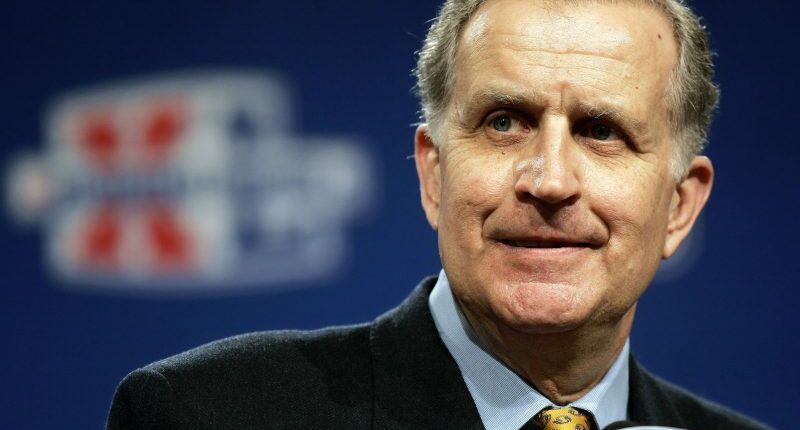Share this @internewscast.com
Paul Tagliabue, who helmed the NFL through a period of remarkable prosperity and growth, has passed away at the age of 84. The news was confirmed by NFL spokesperson Brian McCarthy, who stated that Tagliabue’s family had notified the league of his passing in Chevy Chase, Maryland.
Tagliabue served as the NFL commissioner from 1989 to 2006, succeeding Pete Rozelle. His tenure is notable for significant expansions and lucrative television deals that bolstered the league’s financial standing. Despite facing challenges, he successfully navigated the league through these times without any labor stoppages.
His leadership saw the construction of numerous stadiums and the reshaping of the league’s landscape, including the controversial shifts involving Los Angeles losing two teams and Cleveland seeing its team move to Baltimore, only to be replaced by a new expansion franchise.

In recognition of his contributions, Tagliabue was inducted into the Pro Football Hall of Fame in 2020 as part of a special centennial class. He battled Parkinson’s disease in later years. His legacy is carried on by current Commissioner Roger Goodell, who succeeded him.
Reflecting on his predecessor, Goodell expressed profound gratitude: “Paul was the ultimate steward of the game — tall in stature, humble in presence and decisive in his loyalty to the NFL. I am forever grateful and proud to have Paul as my friend and mentor. I cherished the innumerable hours we spent together where he helped shape me as an executive but also as a man, husband and father.”
During his time, Los Angeles lost two teams and Cleveland another, migrating to Baltimore before being replaced by an expansion franchise.
Tagliabue implemented a policy on substance abuse that was considered the strongest in all major sports. He also established the “Rooney Rule,” in which all teams with coaching vacancies must interview minority candidates. It has since been expanded to include front-office and league executive positions.
When he took office in 1989, the NFL had just gotten its first Black head coach of the modern era. By the time Tagliabue stepped down in 2006, there were seven minority head coaches in the league.
Tagliabue certainly had his detractors, notably over concussions. The issue has plagued the NFL for decades, though team owners had a major role in the lack of progress in dealing with head trauma.
In 2017, Tagliabue apologized for remarks he made decades ago about concussions in football, acknowledging he didn’t have the proper data at the time in 1994. He called concussions “one of those pack-journalism issues” and contended the number of concussions “is relatively small; the problem is the journalist issue.”
“Obviously,” he said on Talk of Fame Network, “I do regret those remarks. Looking back, it was not sensible language to use to express my thoughts at the time. My language was intemperate, and it led to serious misunderstanding. I overreacted on issues which we were already working on. But that doesn’t excuse the overreaction and intemperate language.
“Bottom line, it sounded like I was shooting the messenger, which was the concussion issue. My intention at the time was to make a point which could have been made fairly simply: that there was a need for better data. There was a need for more reliable information about concussions and uniformity in terms of how they were being defined in terms of severity.”
Tagliabue is survived by his wife Chandler, son Drew, and daughter Emily.

















